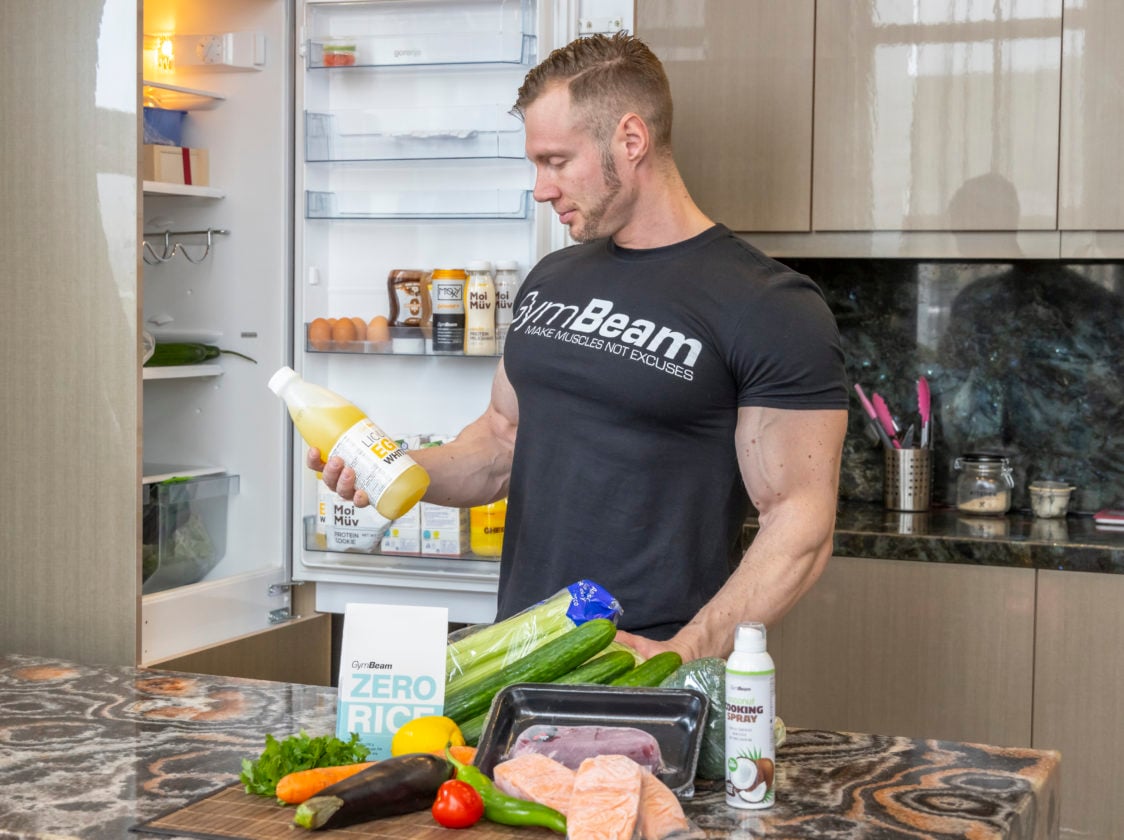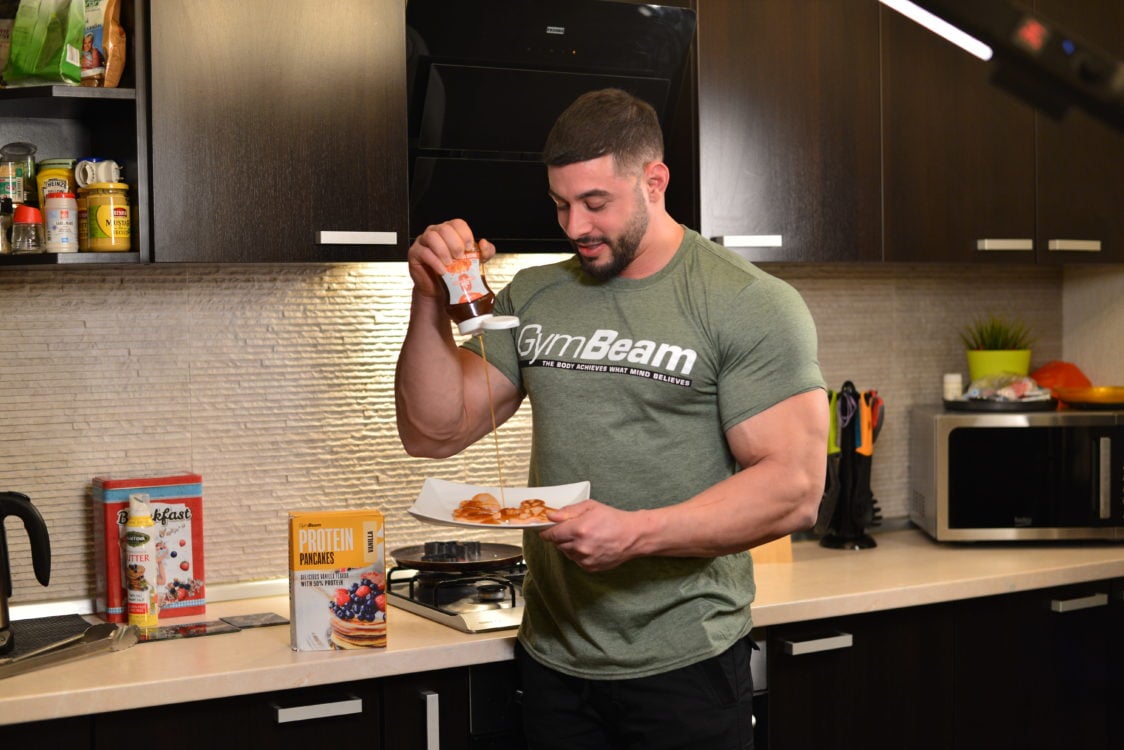Table of Contents
Protein or proteins are one of the most important nutrients for our body. They are the alpha and omega in the fitness world because they function as a basic building block for the growth and maintenance of muscle mass and the cells of the immune system. However, proteins are not only important for active athletes as they have a really wide effect on our functioning. They have a positive effect on bone health, skin, enzyme production, hormones and play a vital role in all body tissues. Life without them would therefore not be possible, and our organism also uses proteins to create connective tissues (ligaments, cartilage and bones) and muscle tissues (smooth, cardiac and striated).
The good news is that you can find proteins in a wide range of foods that you normally consume every day. The best sources of protein are poultry, dairy products, fish, eggs, legumes, nuts and various whole grain products. Optimal protein intake depends on several factors. If it is insufficient, it can affect your health or your ability to achieve your fitness goals. So how to recognize protein deficiency? [1]
How proteins work in our body
Before we begin to describe the signs of lack of protein, we need to say something about how they work. During digestion, proteins in our body are broken down into amino acids. These help the body to function and grow optimally. Therefore, as mentioned in the introduction, this macronutrient is important for healthy and strong muscles, bones, hair and nails.
There are eight essential and eleven non-essential amino acids, of which arginine or histidine, for example, are partially essential (necessary in certain processes). The difference between essential and non-essential amino acids is that the essential ones cannot be produced by our body on its own. Therefore, we should consume them in the diet or nutritional supplements. The storage of amino acids in our body is taken care of by the so-called amino acid pool. It is a term that characterizes amino acids in the circulatory system, where they are immediately available to our body, for example in protein synthesis. However, the capacity of the amino acid pool is very small. Therefore, we should not forget to supply our body on a regular basis. Simply put, if we do not get enough protein, our health may be at some risk. [8] [9]

Optimal daily protein intake for adults
So how much protein should you eat? The optimal daily protein intake is the amount you should consume every day for the healthy functioning of your body. It depends on several factors, including gender, lifestyle, current weight, physical activity or fitness goals. [4]
The minimum amount should be 0.8 g per kilogram of body weight. However, this is true for people who have inactive lifestyle. For most others, this amount is insufficient and the most discussed value is thus on average around 1.2 to 1.8 g / kg. However, if you exercise, your protein intake should be even higher. For example, if you do strength exercise, your protein intake should be around 1.4 – 2 g / kg. However, the need for protein may increase even more in accordance with your physical activity, or in a combination of a cutting diet and training. [2] [3] [14]
To learn more about protein intake, read our article When and How Much Protein to Take for Maximum Results. Our Online Energy and Macronutrient Calculator can also help you find your optimal intake.
You might be interested in these products:
Signs of insufficient protein intake
As mentioned in the introduction, insufficient protein intake has a very negative effect on your health. A condition of low levels of protein in your blood is called hypoproteinemia. Signs of insufficient protein intake vary and can range from less severe to severe. Here are some examples:
- fatigue and weakness
- recurrent viral or bacterial infections
- mood swings
- craving for foods rich in protein
We should also mention that these symptoms may also be associated with a general lack of energy and other health problems. Therefore, the diagnosis of hypoproteinemia is only possible after a medical examination. However, protein deficiency also brings other problems. Below we will introduce you to 5 warning signs you should be aware of. [10]
1. You feel dissatisfied and hungry shortly after a meal
Feelings of hunger fluctuate throughout the day. It is therefore natural that after strenuous training you are more hungry than during days when there is less physical activity. However, if you feel dissatisfied and hungry shortly after eating, it may be a sign of a lack of protein. The body digests proteins more slowly than carbohydrates, which are an immediate source of energy. It is a good idea to include a source of protein, complex carbohydrates and fats in every meal. The resulting food will be nutritionally balanced, it will take longer to digest it, and it will provide you with a more stable flow of energy or a feeling of satiety.

It is the feeling of satiety which lasts longer than with foods with a lower protein content. If you don’t get enough protein, you may notice a greater appetite and a desire to munch on some snack. Often this urge is associated with the appetite for sweet, savoury, fatty or caloric foods, the consumption of which can lead to weight gain. [5] [15]
2. You lose muscle mass
Muscles are the largest store of protein in the body. If you don’t eat enough protein, the body will deal with it by taking amino acids from skeletal muscles. It is to protect important tissues and functions of the body. As a result of this process, protein deficiency leads to muscle loss over time, known as sarcopenia. It is a syndrome of gradual loss of muscle mass, strength or function. [16]
This usually happens to the elderly and it can happen even if the lack of protein is minimal. However, a problem can also occur when you don’t get enough protein and combine this with too much physical activity. However, according to studies, the muscle degeneration can be reversed by increasing the protein intake. To gain muscle mass, it is ideal to combine a sufficient protein intake with strength training. Enough muscle mass is then one of the prerequisites for a longer and better life. [6] [17]

3. You have problems with your hair, skin and nails
Hair loss, dry skin or brittle nails can be one of the first signs that your protein intake is not sufficient enough.
Biotin, a water-soluble vitamin B, is essential for the metabolism of branched-chain amino acids.
These are found in proteins. And biotin is needed to maintain healthy hair, skin and nails.
Lack of protein and biotin usually goes hand in hand. Hair, skin or nail problems can also be related to deficiency of: [7] [18]
- Zinc
- Iron
- Omega 3 fatty acids
If you are interested in this topic, we recommend our article How to Improve Hair Quality and Which Vitamins Are Best for Them?
Quality of your skin, nails or hair can also be related to the lack of collagen, which we discussed in the article How to Choose the Best Collagen for Healthy Skin and Joints?
4. You have trouble sleeping
If you have ongoing sleep problems, your body may want an increased protein intake. The process of breaking down protein is much slower than in the case of carbohydrates.
If you lack protein and energy, it might cause that you can wake up every 2-3 hours during the night because your body wants its next meal. Eating enough of protein, along with a well-designed diet, will give you a greater feeling of satiety and better insulin stabilization. This might also lead to uninterrupted sleep. [11]
Poor sleep is also involved in a number of other issues. If you are interested in this topic, be sure not to miss our article What Happens to Your Body When You Don’t Sleep Enough.
5. You are stressed and cannot concentrate
The release of stress hormones can have an effect on increased muscle and tissue breakdown. It is important to realize that stress is to blame. If you do not have enough protein in your diet, there will be nothing to recover. Your tissues can suffer as a result of a stressful lifestyle and inadequate nutrition. In addition, protein deficiency also affects your concentration.
If you can’t concentrate, your diet may be responsible. Neurotransmitters such as serotonin and dopamine need the right amount of amino acids for their synthesis, which is provided by proteins. Their deficiency can lead to malaise, poor concentration and reduced mental alertness. [12]
Tips on how to supplement the missing protein
If you feel that you lack enough protein, you can reach for some proven tips on how to supplement it. Among the most effective are [13]:
- Limit processed foods. Instead of consuming too much simple carbohydrates and sugars, try to eat as little processed food as possible. Instead, have some legumes, meat, nuts, dairy products, etc.
- Try to have protein in every meal. The key is that each of your meals contains a portion of protein. Thanks to this, your diet will be balanced and healthy.
- Don’t shy away from alternative sources of protein. Try, for example, vegetable protein found in legumes, nuts, beans or soy.
- Don’t forget about snacks. Often underestimated snacks can be a great source of protein supplementation. An excellent choice can be, for example, protein bars, cookies and the like.
Consider supplementation. Protein supplements are among the most effective tools to help with the supply of more protein. You can supplement it with the help of high-quality whey, plant-based, beef or multi-component protein.

An overview of the best sources of protein
From what we said so far it is clear that a diet high in protein has many benefits to our health and can help prevent more issues. Therefore, you should give a try to the best sources of protein, which include:
- beef and chicken
- fish and seafood
- milk, cheese and dairy products
- legumes (peas, beans, lentils)
- pseudo-cereals (buckwheat, amaranth, quinoa…)
- nuts and seeds
- tofu and tempeh
- vegetable meat substitutes
- whey and vegetable protein
- protein bars
If you are interested in the best sources of protein from a more detailed point of view, be sure to check out our article 20 Foods Which Can Easily Add Protein to Your Diet.
Summary
After reading the article, you should know that protein is one of the most important nutrients that should definitely not be missing in your diet. Not only is it the cornerstone of muscle growth and maintenance, but it also contributes to a number of biological processes, including the proper functioning of the immune system. The optimal daily intake of protein is approximately at the level of 1.2 to 1.8 g / kg. However, with an active lifestyle, this number should at the upper end of this value. If your body lacks protein it can result in unpleasant health issues. The lack of protein is associated with feelings of hunger, loss of muscle mass, mood swings, poor sleep or inability to achieve your fitness goals. You should therefore try to include protein in every meal. Its best sources include meat, legumes, fish and dairy products.
How are you doing with your protein intake? Do you make sure that you are getting enough of it, or should you be doing better? What is your main source of protein every day? Don’t forget to share your opinions with us in the comments. If you liked the article, please share it so that your friends know that protein intake should not be underestimated.
[1] Protein – https://www.betterhealth.vic.gov.au/health/healthyliving/protein
[2] Optimal Protein Intake Guide – https://examine.com/guides/protein-intake/#how-much-protein-do-you-need-per-day
[3] Dietary Reference Intakes for Energy, Carbohydrate, Fiber, Fat, Fatty Acids, Cholesterol, Protein, and Amino Acids – https://www.nap.edu/read/10490/chapter/1
[4] Neil “Yoda” Hill - 6 FACTORS THAT AFFECT YOUR PROTEIN REQUIREMENTS – https://www.muscleandfitness.com/flexonline/flex-nutrition/6-factors-affect-your-protein-requirements/
[5] Emily Abbate - 10 Signs You’re Not Eating Enough Protein – https://blog.myfitnesspal.com/5-signs-youre-not-eating-enough-protein/
[6] R A Wiswell, S A Hawkins, S V Jaque, D Hyslop, N Constantino, K Tarpenning, T Marcell, E T Schroeder - Relationship between physiological loss, performance decrement, and age in master athletes – https://pubmed.ncbi.nlm.nih.gov/11584034/
[7] Lea Basch - Are You Getting Enough Protein? 7 Surprising Signs You Might Have A Deficiency – https://www.mindbodygreen.com/0-24225/7-surprising-signs-youre-not-getting-enough-protein.html
[8] Nathan Ahlgren - What is a protein? A biologist explains – https://theconversation.com/what-is-a-protein-a-biologist-explains-152870
[9] Darla Leal - The Effects of Protein Deficiency The Importance of Amino Acids – https://www.verywellfit.com/what-are-the-effects-of-protein-deficiency-4160404
[10] Jennifer Berry - What to know about hypoproteinemia – https://www.medicalnewstoday.com/articles/320050#symptoms
[11] Tyler Spraul - FOUR SIGNS YOUR BODY DOESN’T GET ENOUGH PROTEIN – https://www.exercise.com/learn/4-signs-your-body-doesnt-get-enough-protein/
[12] Anna Magee - 7 signs you’re not getting enough protein plus EXACTLY how to get more – https://www.healthista.com/7-signs-not-getting-enough-protein-plus-how-to-get-protein/
[13] Brittany Smith - 13 Negative Side Effects of Not Getting Enough Protein – https://www.mensjournal.com/food-drink/13-negative-side-effects-not-getting-enough-protein/
[14] Ralf Jäger, Chad M. Kerksick, Bill I. Campbell, Paul J. Cribb, Shawn D. Wells a kol. - International Society of Sports Nutrition Position Stand: protein and exercise – https://jissn.biomedcentral.com/articles/10.1186/s12970-017-0177-8
[15] Sanne Griffioen-Roose, Monica Mars, Els Siebelink, Graham Finlayson, Daniel Tomé, Cees de Graaf - Protein status elicits compensatory changes in food intake and food preferences – https://pubmed.ncbi.nlm.nih.gov/22158729/
[16] Valter Santilli, Andrea Bernetti, Massimiliano Mangone, Marco Paoloni - Clinical definition of sarcopenia – https://www.ncbi.nlm.nih.gov/pmc/articles/PMC4269139/
[17] Howard Luks - Muscle Mass, Strength, and Longevity – https://medium.com/@hjluks/muscle-mass-strength-and-longevity-4e6fd68fcb2b
[18] Erika Geisheimer - 6 Reasons Why…Your Hair, Skin and Nails are Suffering – https://www.mysteinbach.ca/blogs/8386/6-reasons-why-your-hair-skin-and-nails-are-suffering/

Add a comment